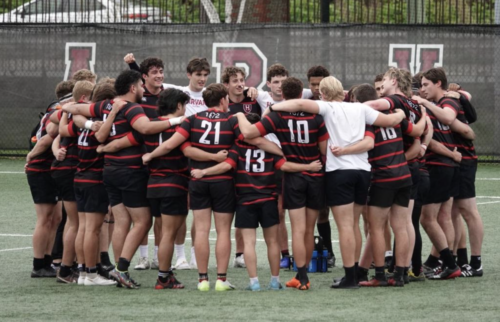The Springfield Men’s Club Soccer Team pulls up to play against their Harvard counterpart in large coach buses. When the Harvard Men’s Club Soccer Team travels to Tufts or Holy Cross, they have to take the T or call Ubers on their own dime. According to co-captain Joe Fahn ’25, “there’s no reason [that] should be happening.”
Getting to and from games is just one example of the many challenges Harvard’s student-run club sports teams face. They must also coordinate field, court, and rink times with the Harvard Athletic Department, which often double-books spaces or cancels time slots with little notice. Yet despite the relative lack of support Harvard provides its club sports, club athletes are overwhelmingly positive about their overall experience.
The Club Sports Office (CSO), a branch of the Department of Harvard Athletics & Recreation, oversees more than 50 club sports and supplements Harvard Undergraduate Association funding by providing additional grants to Harvard’s club sports teams. Given the large number of club sports that fall under the CSO umbrella, allocating funds can be very challenging, often leaving teams with inadequate resources. Harvard Rugby Football Club (HRFC) President Charlie McCormick ’24 said, “I think managing over 50 club sports on campus and balancing their access to facilities and resources with varsity programs is an immensely challenging task, but the CSO … does a really solid job making everything happen for us.” “We’ve had a few hiccups, but for the most part it’s been good,” echoed Fahn.
The lack of resources available to club teams forces many of them to operate on shoestring budgets. The Men’s Club Soccer coach, Manish Raghavan, is unpaid and volunteers his time to coach the team. “[He] is actually an MIT professor,” said Fahn. “It’s really sweet that he takes the time to come out and practice with us and come to all of our games.” Despite saving costs on coaching, they still have to reach out to alumni and parents for donations to supplement CSO funding, which is not enough to run both the “A” and “B” teams. “We have two teams, but we’re viewed as one organization,” Fahn said, “That makes it really tricky, especially because we haven’t had [player] dues in the past.”
Men’s Club Soccer is a team with few expenses beyond paying referees, but other teams face much greater costs. Club Ice Hockey, for example, must account for the hefty costs of ice time, travel to other schools with ice rinks, and expensive equipment. In regard to the equipment, Co-captain Avery Barakett ’24 said, “It’s not something that you want to cheap out on because it’s [for] your safety.”
After joining the Independent Women’s Club Hockey League Presidential Division this year, the Women’s Club Hockey team increased their fundraising efforts and hired an official coach for the first time ever. “It would have been helpful to have a coach [previously],” said Barakett, “[but] we couldn’t really justify taking thousands of dollars out of our budget to pay somebody.”
HRFC also recently hired a full-time coach in addition to its several assistant coaches. “This is the first year in the program’s 150-year history we’ve had a full-time head coach, and it’s the product of years of immense support from our alumni, as well as friends and family,” shared McCormick.
Beyond the funding issues, there are also questions about how Harvard supports club athletes’ safety. Barakett recently injured her wrist and received treatment from the athletic trainer, who she described as “super helpful.” However, most club athletes do not even realize they have this access. “I kind of only knew because I’m a captain and have to read all the by-laws,” said Barakett.
Notwithstanding the shortcomings of Harvard’s support for its club sports, club athletes share an appreciation for their teams and for the opportunity to play the sports they love. Fahn said, “I feel like when you leave high school, sometimes it’s hard to maintain a competitive environment where it’s fun and people care, but this has definitely been a great spot, and I’m lucky to have it.”
When reflecting on HRFC, McCormick said, “we’re a home for athletes who want to compete at a very serious level while also fostering inclusivity.” He added, “not only have I been able to learn about and immerse myself in a really elegant sport I knew nothing about previously, but it’s one of the most diverse and socially active communities I’m part of.” Barakett has also loved her time on her team. “We have people with all different concentrations, all different years, levels of experience, levels of commitment, [but], at the end of the day, everybody just shows up and has a good time,” she said. What more can a Harvard student ask for?
Gemma Maltby ’27 (gmaltby@college.harvard.edu) is a proud member of Harvard’s under-funded Women’s Club Soccer team. Help the team get to their regional tournament by donating to this GoFundMe.

